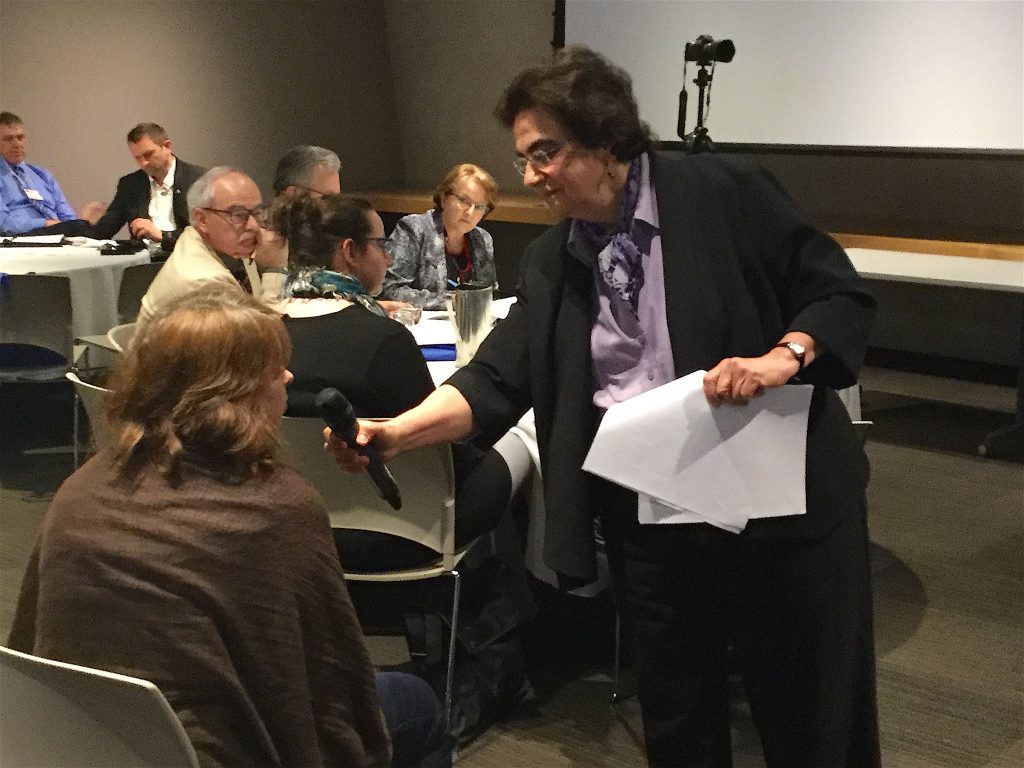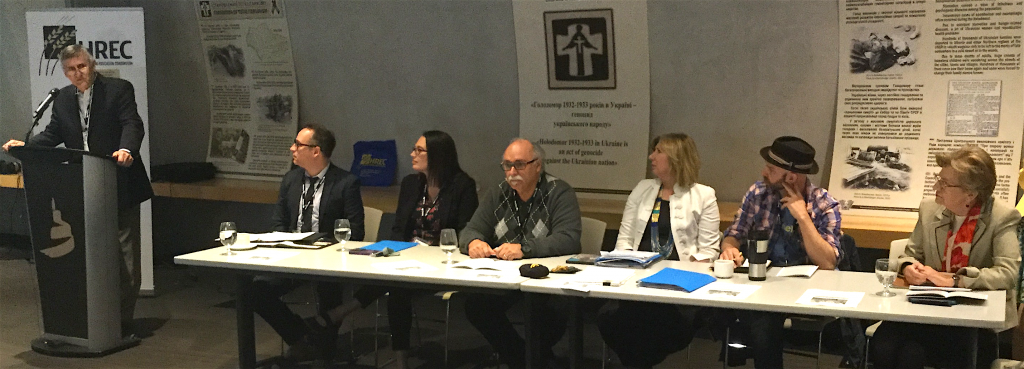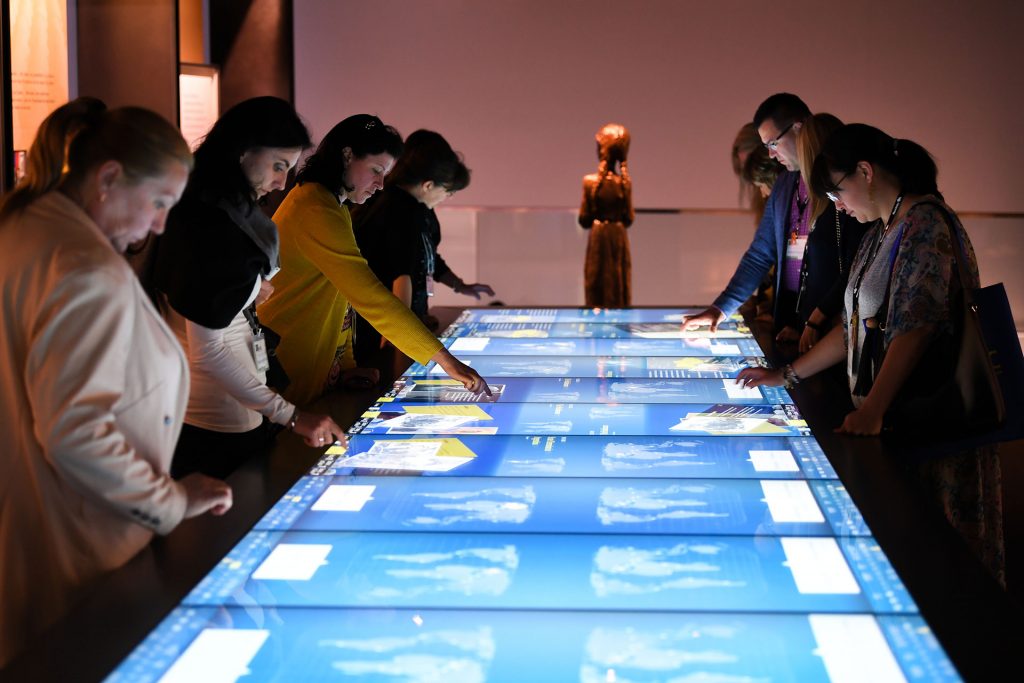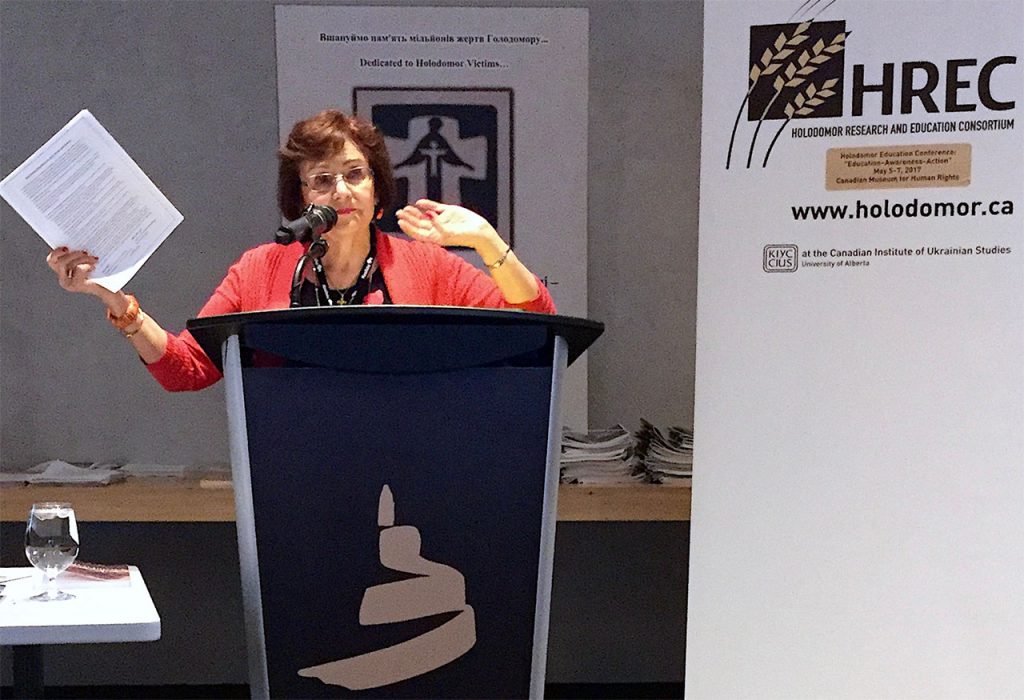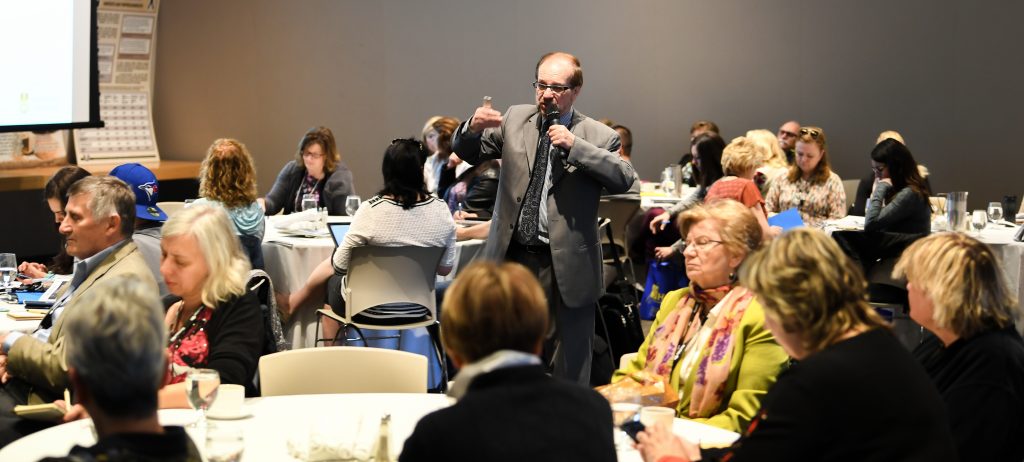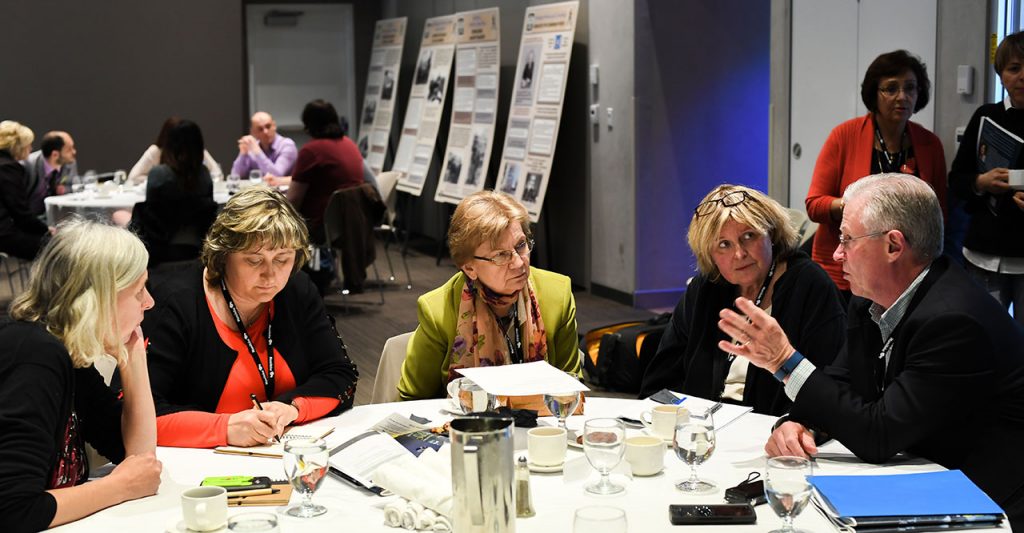Holodomor Education Conference 2017
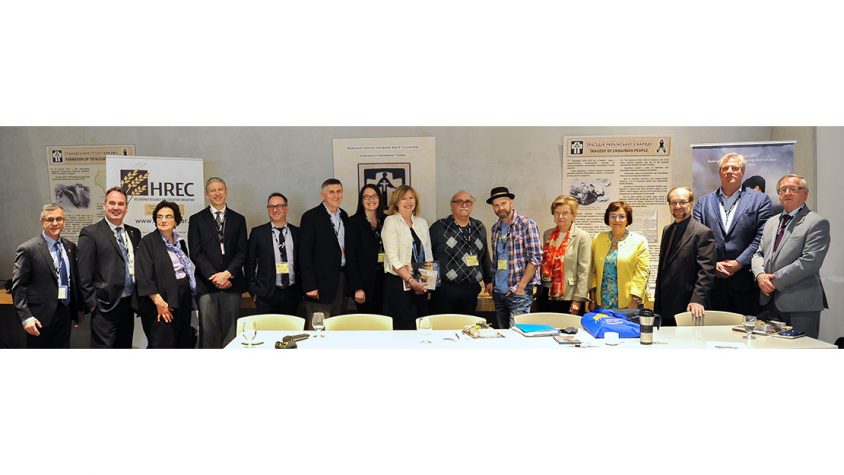
On this page
- Holodomor Education Conference 2017 gives educators numerous tools to teach Ukrainian genocide
- Comments from participants and presenters on the “Holodomor Education Conference: Education–Awareness–Action,” May 5–7, 2017
- Conference Program (PDF)
- Photos
- Other Links
Holodomor Education Conference 2017 gives educators numerous tools to teach Ukrainian genocide
By Sophia Isajiw, Assistant to the Director of Education, HREC
WINNIPEG – Educators from across Canada, the USA and Ukraine assembled in Winnipeg, Manitoba, to attend the second Holodomor Education Conference: “Education–Awareness–Action” (HEC–2017) on May 5-7, 2017, at the Canadian Museum for Human Rights (CMHR). The conference was organized by the Holodomor Research and Education Consortium (HREC), of the Canadian Institute of Ukrainian Studies (CIUS) at the University of Alberta, and held in cooperation with the Canadian Museum for Human Rights. The organizing committee included Valentina Kuryliw, Director of Education (HREC) and committee Chair, Sophia Isajiw and Oksana Levytska of Toronto, Val Noseworthy, Irka Balan, Dr. Orest Cap and Dr. Denis Hlynka of Winnipeg.
The HEC–2017 conference brought together 120 education professionals, all of whom teach from kindergarten to university. Educators of senior grades made up approximately half of the participants, while the primary and middle years were well represented. Participants shared a desire to learn about new approaches and innovative strategies from 25 conference presenters speaking on how to teach human rights, social justice and the Holodomor in their classrooms. They were especially grateful for the handouts and suggestions for implementing the teaching of this often forgotten topic in school curricula. It was rewarding to observe that the participants came from diverse ethnic backgrounds and had a strong interest in human rights and genocide.
Valentina Kuryliw delivered the opening remarks. John F. Young, the President and CEO of the Canadian Museum for Human Rights welcomed the gathering to the Museum. James Bezan, who is the Member of Parliament for Selkirk–Interlake–Eastman that introduced the Bill recognizing the Holodomor as genocide in the Canadian House of Commons in 2008, spoke movingly on the reasons for its recognition. Greetings were offered by Mr. Blair Yakimoski, MLA for Transcona representing the Hon. Ian Wishart, Manitoba’s Minister of Education and Training, along with Dr. David Mandzuk, Dean of the Faculty of Education at the University of Manitoba. The Hon. Mitzie Hunter, Ontario’s Minister of Education, sent written greetings read by Kuryliw. It is notable that the Faculties of Education of both the University of Manitoba and the University of Winnipeg supported the Holodomor education conference.
Keynote speaker, Dr. Joyce Apsel, Clinical Professor in the Liberal Studies Program at New York University and President of the Institute for the Study of Genocide, spoke eloquently about “Genocide, Human Rights and the Holodomor: Teaching Human Rights and Wrongs in the Classroom,” and stressed that the Holodomor and human rights need to be relatable and therefore made more personal for students. She then demonstrated how this is done by moving into the audience and interacting with participants directly.
Dr. Richard Hechter, Acting Department Head of Curriculum, Teaching and Learning, Faculty of Education, University of Manitoba, moderated a very lively, thoughtful and diverse panel discussion on “The Teaching of Human Rights and the Holodomor.” It included presentations by Dr. John R. Wiens, Dean Emeritus and Professor of Educational Administration, Faculty of Education, University of Manitoba, Lise Pinkos, Manager of Education Programs, Canadian Museum for Human Rights, Antonio José Tavares who is the Diversity Education and International Languages Consultant for the Instruction, Curriculum and Assessment Branch of Manitoba Education and Training. Tavares gave a very insightful and grounded talk on “Holodomor and Genocide Education with Children of Refugee and War-Affected Backgrounds.” The panel also included Linda Connor, Social Studies Consultant for Manitoba Education and Training who was very thorough and specific in her examples of achievements in Holodomor education in Manitoba, and Michael Anthony, who spoke dedicatedly and passionately about “Teaching the Holodomor: Making Best Practices Better.” Anthony is Assistant Curriculum Leader for Canadian and World Studies at Weston Collegiate Institute in the Toronto District School Board. In post-conference remarks he remarked, “As someone who did not grow up with stories of the Holodomor, but who is teaching the Holodomor to students, this conference was a most important learning experience. I gained valuable information and insight from the many presenters. It has also been amazing to become part of the community of people who are Holodomor and human rights activists and educators in North America.“ Librarian and Holodomor Website Manager and Coordinator of the Holodomor Educators Network in the USA, Lana Babij, rounded out the panel by expertly addressing “The Challenges of Terminology and Resources” on the Holodomor, a very timely topic to educators.
The methodology sessions rounded out the conference by providing practical hands-on suggestions for implementing human rights and the Holodomor in school curricula. Natalia Onyschuk shared her expertise at the primary level, showing how song, dance, art and stories can be used to teach a difficult and sensitive topic. Lise Pinkos and Ian Martens showcased the Museum’s new lesson on the Holodomor for the middle years, while Jeff Kozak of Winnipeg presented his best practices in teaching the Holodomor for grades 5-8.
Tamara Kowalczyk shared her expertise and experience in teaching the Holodomor within a genocide course at the high school level, and Nadia Prokopchuk and David Katzman shared handouts and information on an innovative new online human rights resource, entitled: “Voices into Action” whose fifth chapter features lessons on the Holodomor.
Saturday’s conference sessions concluded with conference participants taking a guided tour of the impressive exhibit areas of the new Canadian Museum for Human Rights, including the space allocated for learning about the Ukrainian Holodomor.
On Sunday, the conference ended with three presentations. The first, by Valentina Kuryliw, emphasized the latest resources and activities on the Holodomor, including websites, DVDs and print materials available for educators and students. The 20-page excerpt she also shared from her soon-to-be published 300-page educator’s manual, Holodomor in Ukraine, the Genocidal Famine 1932-1933: Learning materials for teachers and students was deemed unanimously helpful to the educators present because it is chockfull of teaching materials for students, lessons and projects. The second presentation was led by Dr. Orest Cap and Dr. Denis Hlynka of the Faculty of Education at the University of Manitoba and dealt with the problems of finding accurate digital information on the Internet and social media and the use and abuse of such information when studying the Holodomor, social justice and human rights issues. Val Noseworthy, Middle Years Consultant with Manitoba Education and Training, concluded the morning’s presentations with why and how to engage students in the classroom.
Meredith McGuinnes, a teacher at Swan Valley Regional Secondary School described the conference as “fabulous and inspiring; very important to me as the granddaughter of a Holocaust survivor to be able to share the Holodomor and the importance of discussing genocides in my Grade 9-12 Social Studies classes in Northern Manitoba.”
Larry Mikulcik, a Curriculum Coach for Horizon School Division in Humboldt, Saskatchewan, summarized the importance of the conference to his administrative work this way: “First and foremost, I have to say how much I enjoyed the conference this past weekend, and also how much the teachers in our school division will benefit by the information and resource connections I am able to bring back to them. I also look forward to incorporating a great deal of the Holodomor Genocide information into our annual symposium for students.”
The conference concluded with participants gathering in groups to reflect on what they found most helpful during the proceedings and what they hoped to implement upon their return to their schools. It was gratifying to hear the wide range of positive responses and action plans. As Dr. Joyce Apsel summed it up, “I very much enjoyed being at the conference, learning from all the teachers and hearing Norman Naimark’s important comments. It was such a special, rewarding, educational experience for all.”
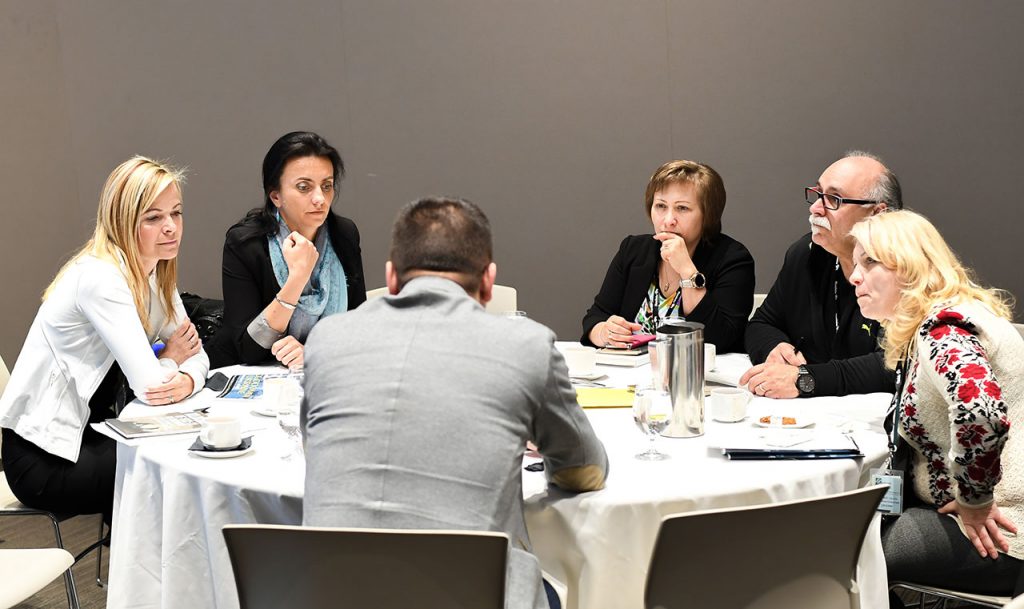
The HREC Holodomor Education Conference was made possible by the Temerty Foundation and was co-sponsored by The Shevchenko Foundation, Carpathia Credit Union Ltd., Manitoba Education and Training, the Faculty of Education–University of Manitoba, the Faculty of Education–The University of Winnipeg, the Centre for Ukrainian Canadian Studies–University of Manitoba, the Ukrainian Canadian Research and Documentation Centre (UCRDC)–Toronto, the National Holodomor Education Committee of the Ukrainian Canadian Congress, the Holodomor Awareness and Education Committee of the Ukrainian Canadian Congress–Manitoba Branch, the Ukrainian Academy of Arts and Sciences in Canada, St. Mary the Protectress Ukrainian Orthodox Millennium Villa Inc., CanadInns, the League of Ukrainian Canadians and was held in cooperation with the Canadian Museum for Human Rights.
Comments from participants and presenters on the “Holodomor Education Conference: Education–Awareness–Action,” May 5–7, 2017
“As someone who did not grow up with stories of The Holodomor, but who is teaching The Holodomor to students, this conference was a most important learning experience. I gained most valuable information and insight from the many presenters. It has also been amazing to become part of the community of people who are Holodomor and Human Rights activists and educators in North America.”
– Michael Anthony, HEC–2017 Panel Presenter and Assistant Curriculum Leader for Canadian and World Studies, Weston Collegiate Institute, Toronto District School Board
“The recent 2017 Holodomor Education Conference, “designed especially for those who want to teach about human rights and the Holodomor,” distinguished itself in two key ways. Specifically, the combination of two approaches (i.e., the inclusion of both ‘academic speakers’ plus ‘hands on teaching methods workshops’) distinguished this conference from others. First, the conference brought in keynote speakers Dr. Joyce Apsel from New York University and Dr. Norman Naimark from Stanford University, who are experts in genocide and the Holodomor. Both keynote speakers have contributed tremendously to our understanding of the Holodomor as a genocide. As a PhD Psychology student who researches the intergenerational impact of the Holodomor, both key note speakers offered perspectives that deepened my understanding as to why the Holodomor is not just relevant to Ukrainians, but is also relevant to all people – as a human rights issue. Second, the conference also offered hands-on training seminars for educators, in terms of providing Kindergarten to Grade 12 methods for incorporating the Holodomor into classroom teaching of human rights and social justice. As a psychology graduate student, whose research incorporates a child development perspective, I was particularly interested in learning what Holodomor teaching methods have been developed for young children (i.e., Kindergarten to Grade 4). To this end, Natalia Onyschuk from Edmonton led a workshop showcasing her ‘tried’ methods that included arts and crafts, songs, story books, and videos, among other techniques to teach the Holodomor in a non-intrusive way to young children, which in turn serve as a foundation for later scaffolded Holodomor and human rights education with older children. While the workshop also facilitated teachers and educators in sharing their teaching methods, the conference overall was a valuable resource for networking. To this end, I met, and exchanged emails with, teachers and policy makers from across Canada, and also from the United States and Ukraine. Lastly, the venue of the Canadian Museum for Human Rights in Winnipeg was especially appropriate for housing the conference. I look forward to attending future Holodomor Education Conferences. “
– Brent Bezo, Ph.D. candidate in Psychology, Carleton University, Ottawa, ON
“First and foremost, I have to say how much I enjoyed the conference this past weekend, and also to say how much the teachers in our school division will benefit by what information and resource connections that I am able to ‘bring back to them.’ I also look forward to incorporating a great deal of the Holodomor Genocide information into our annual symposium for students. My goal is to move from a mainly Holocaust based event to one that is a Genocide Symposium featuring the Holodomor, the Holocaust and possibly the Rwanda genocide.”
– Larry Mikulcik, Education Coach, participant, Edmonton, May 2017
“I very much enjoyed being at the conference; and learning from all the teachers and hearing Norman Naimark’s important comments. It was such a special, rewarding, educational experience for all.”
– Joyce Apsel, HEC–2017 Keynote Speaker and Clinical Professor in the Liberal Studies Program, College of Arts & Sciences at New York University and president of the Institute for the Study of Genocide.
“First off, let me repeat what an outstanding conference this event was!!! You and your team are to be congratulated for all your efforts – from selection of site, getting sponsors, selection of speakers and topics, promotion, attentiveness to all attendees and speakers etc, etc – and everything that went into the success of all your efforts. It was an amazing achievement and I heard nothing but praise from anyone I spoke with.
I feel even more honored after the conference – that you invited me to be a speaker among such a talented and interesting array of presenters that were included in the conference program.”
– Lana Babij, librarian, Holodomor Website Manager and Coordinator, Conncecticut
“Thank you again for inviting me to be a part of the conference. It was fantastic. I thought there was a great mix of people and I especially enjoyed Dr. Apsel and Dr. Naimark’s presentations. Many of the panelists had interesting things to say too. Congratulations – it was really well done.”
– Tamara Kowalczyk, HEC–2017 presenter and teacher, Toronto Catholic District School Board
“Thank you so much for sharing your knowledge and passion for Holodomor. I learned so much during the weekend, and excitedly incorporated a Genocide unit into my Global Issues course to end the year. We will be looking at the Holodomor beginning next week!” – Carina Romagnoli, History Teacher, Westwood Collegiate, Winnipeg, MB.
“It was a great opportunity to connect with other teachers from different provinces. We talked so much after the conference and during breaks. My gain from the conference is
that we as teachers in Ukrainian Programs need a virtual place where we can exchange our resources and project ideas.
I really enjoyed the session with Natalka Onyschuk for primary grades. That presentation gave me so many ideas on what to do next year. Since I teach elementary school, I was hoping for more hands on/resource sharing groups during the conference. I especially was surprised by the parallel with Syrian refugees and the similarities between Holdomor…talking about trauma in children – it was an eye opener for me.
I also liked the museum, what a great high tech presentation about human rights and the Holodomor. I wish I could take my class on a field trip there.
Thank you again for everything that you do to spread the word about this horrific tragedy that happened in Ukraine.
– Yanina Vihovska, teacher and participant, Edmonton Catholic School District
“I would like to thank you once again for the weekend. It was a great experience, and I look forward to incorporating what I learned about the Holodomor into my classes. I was also inspired by Tamara Kowalczyk’s presentation to pitch a course on genocide at my board. As I mentioned at the conference, having the mobile classroom visit our school once again in November would be wonderful.
– Danik Lafleur, Intermediate and Senior Teacher, St. Thomas Aquinas Catholic High School, Russell, Ontario; Catholic District SB of Eastern Ontario
“The Holodomor Conference in Winnipeg this spring provided just the kind of information and support I need to complete my YA novel set in Ukraine in 1933. I have been writing and researching the book for three years. But because the material is so tragic I am often stopped as to what I feel I can write and show in the novel. What the conference gave me was a language for this material that is accurate and appropriate for readers from age 12-18.
The speakers also provided some critical ideas that I want to include in the book: dignity; the right to food; the right to an identity; food as a political weapon; state policy (not the actions of a madman); impunity; moral obligation; loss of culture; displacement and purging; the right to be human and an individual; spontaneity; authenticity; destruction of solidarity; the physical experience of hunger; Russian and Ukrainian history; bystander/up-stander; perpetrator; indoctrination; propaganda; denial and truth; freedom; children’s rights — the right to play, food, sleep in the same bed, be loved by both parents.”
– Cathy Ostlere, conference participant and Author, Calgary, Alberta
“Great conference!”
– Denis Hlynka, Presenter and Professor, Department of Curriculum Teaching and Learning, University of Manitoba
“On behalf of the entire Museum, I would like to express my appreciation for providing us the opportunity to partner with HREC on the 2017 Holodomor Education Conference. We at the Museum thought the conference was a resounding success on all fronts, and we were honoured to play a role in bringing it to fruition. Congratulations to you and the HREC network!”
– Dr. Clint Curle, Senior Advisor to the President, Canadian Museum for Human Rights, Winnipeg, Manitoba

